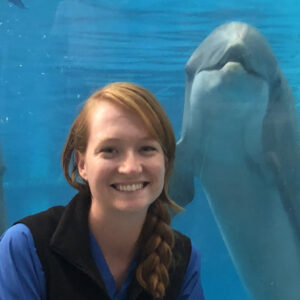Profile

Christine Parker Graham
Christine A. Parker-Graham, DVM, MA, Dipl. ACZM, is Veterinary Medical Officer with the Pacific Region Fish Health Program, US Fish and Wildlife Service. She is currently based out of western Washington, USA, and provides veterinary care and oversight to aquatic species propagated in federal and tribal conservation hatcheries and Abernathy Fish Technology Center. In addition to fish, Christine remains involved in marine mammal medicine as a relief veterinarian at SR3 and the National Marine Mammal Foundation. Beyond the clinical sphere, she is an active participant in many regional and national professional committees and work groups to promote wildlife and conservation medicine. She earned her BA and DVM from University of California, Davis followed by a Zoological Medicine internship at Cornell and an Aquatic Animal Health fellowship at UC Davis. She is a diplomate of the American College of Zoological Medicine (ACZM) and certified by the World Aquatic Veterinary Medical Association. Christine has wide ranging experience with aquatic animals in ex situ conservation, zoos and aquariums, and free-range settings, including the National Aquarium, Monterey Bay Aquarium, Hubbs-SeaWorld Research Institute, Steinhart Aquarium, and the Aquatic Animal Health Lab at UC Davis. She's published several papers and book chapters on the veterinary care of fish and aquatic invertebrates and continues to work on projects to improve health and welfare of aquatic species.
No Pet(s) Left Behind: A Case for Aquatic Animal Evacuation Plans
Wildfires are a part of normal ecology in arid regions throughout the world. However, in the past decade wildfire activity worldwide has increased on unprecedented scales in size, frequency, and severity of fire events. The increased size of human communities in wildland interface zones has also brought more people, and their animals, into contact with wildfire events than ever before. With wildfire activity in arid regions at historic highs and showing no signs of improvement, it is increasingly important that veterinarians are familiar with evacuation, stabilization, and care standards for a variety of species that may be encountered in rescue efforts, including aquatic animals. Rescuing and housing aquatic animals is accompanied by considerations that may not necessarily be pertinent when rescuing terrestrial companion animals, such as the legality of transporting animals out of the disaster zone, prolonged housing of species with special housing requirements (ie: aquatic or nocturnal species), stress and susceptibility to opportunistic disease, and potential transportation of important pathogens with rescued animals. By being prepared to assist with potential aquatic animal evacuation operations, veterinarians can increase their capacity in disaster recovery. This talk will present a summary of lessons learned from evacuating companion aquatic animals from wildfire disasters in Northern California between 2017 and 2019 and will offer veterinarians insight to including aquatic animals in their disaster management plans.
